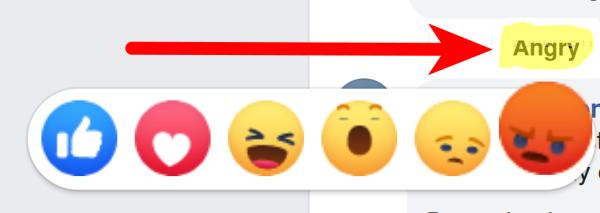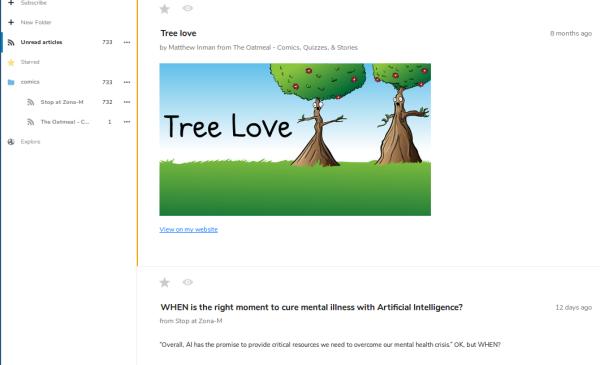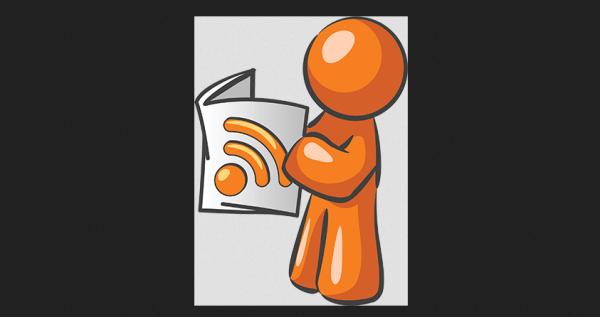THIS is (again) why you need RSS instead of "social" media
Short version: unlike social media, RSS feeds don’t make you [too] angry.

One button to overcome them all
</em></u>
An excellent, slightly longer but really simple answer was recently given in two “No algorithms” posts that I summarize here, with some additions.
First, what is RSS anyway?
RSS (“Really Simple Syndication”) is a protocol to distribute headlines from any websites to everybody who wants to read them, without intermediaries. RSS “aggregators” are programs or websites that periodically collect all the RSS feeds from different source, and then display all the corresponding news as one big list, as in this screenshot from my own review of Nextcloud16:

Bring to your “attention”? No thanks
Brent Simmons, the developer of the NetNewsWire RSS aggregator, was recently asked to add to his program features that:
- bring to the attention of the user articles that she wouldn’t otherwise have seen, or
- display at the top of the list the articles more likely to interest the user
No, he won’t do it. And he’s right
*Simmons won’t add those features. This is my own synthesis of why he won’t:
Those methods optimize for engagement, and the quickest path to engagement is [through] outrage and anger - which require, and generate, bigger and bigger hits.
That is toxic. In the best case, being addictive, it is a waste of time. In the worst, and much more frequent case, it is dangerously polarizing. It creates a bubble that prevents you from realizing you may be wrong about something.
Simmons also says, and I fully agree: “[This is what Twitter and Facebook do, and those algorithms] - driven by the all-consuming need for engagement in order to sell ads - are part of what’s destroying western liberal democracy, and my app will not contribute to that”.
Outrage and anger mask everything else
Joshua Emmons, a contact of Simmons', made the problem even clearer:
- Algorithms weigh “signals” (in this case, from the user reading the aggregated news)
- [when it comes to news] In the domain of engagement, outrage and anger mask all other signals.
- These signals are fatiguing. As Outrage = 5 is normalized, Outrage = 10 is now required to move the needle
The first two points mean that “there’s no way to write an engagement algorithm that doesn’t select for outrage and anger”. If there’s any way, implicit or explicit or both, of signaling engagement (“Like!"), it will tend toward rewarding outrage and anger.
The third point means that “anything that incorporates such an algorithm actually makes us worse people”.
Just read news as they come
Aggregators of news “should be completely trustworthy - you should never wonder if it’s leading you down some path or other you didn’t intend or foresee”. The social networks of today are intrinsically unable to do this. They are built to do exactly the opposite
The way to to go, concludes Simmons, is this:

"[FIRST], You choose the sites and blogs you want to read, and then [a RSS aggregator] reliably shows you their articles sorted by time. That’s it."
Using RSS could be the best things you do online
Not using RSS aggregators to stay informed is one of the Four BAD online habits you very likely have. Sadly, many websites encourage this harmful behaviour. Tell them to stop, and use RSS instead of Twitter, Facebook and their colleagues to stay informed. You will be much less angry, or at least angry for stuff that deserves it.
“RSS newspaper” image source: Dailyhaha
Who writes this, why, and how to help
I am Marco Fioretti, tech writer and aspiring polymath doing human-digital research and popularization.
I do it because YOUR civil rights and the quality of YOUR life depend every year more on how software is used AROUND you.
To this end, I have already shared more than a million words on this blog, without any paywall or user tracking, and am sharing the next million through a newsletter, also without any paywall.
The more direct support I get, the more I can continue to inform for free parents, teachers, decision makers, and everybody else who should know more stuff like this. You can support me with paid subscriptions to my newsletter, donations via PayPal (mfioretti@nexaima.net) or LiberaPay, or in any of the other ways listed here.THANKS for your support!